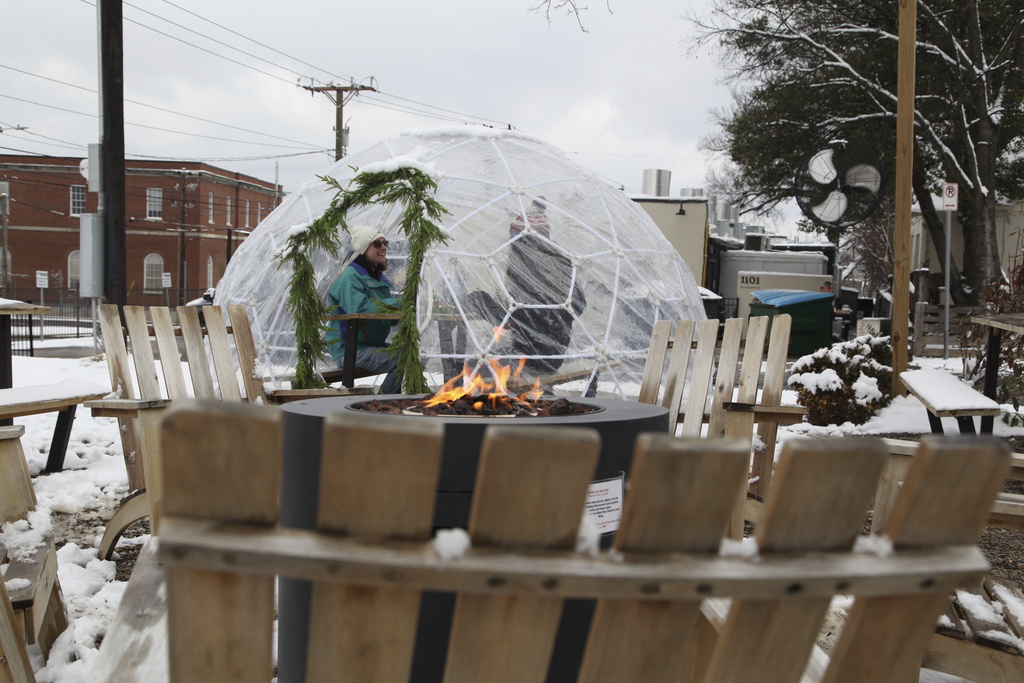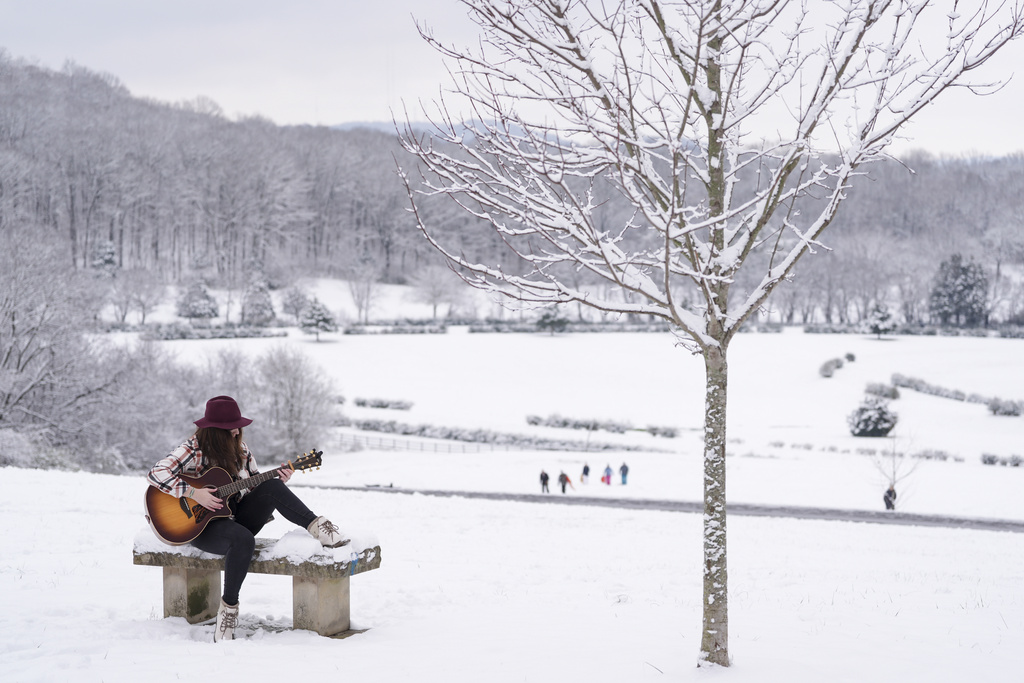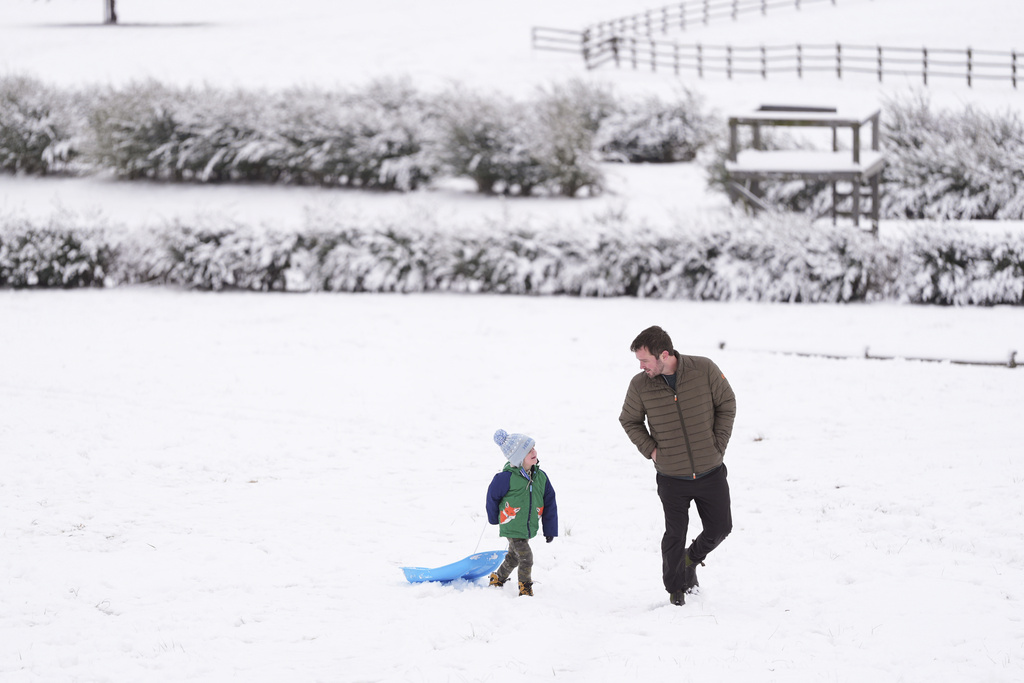ATLANTA (AP) — Flight cancellations piled up and officials warned of continuing dangerous roads Saturday in the wake of a winter storm that brought biting cold and wet snow to the U.S. South, leading to school closures and disrupting travel.
The storm was moving out to sea off the East Coast on Saturday, leaving behind a forecast for snow showers in the Appalachian Mountains and New England. But temperatures were expected to plunge after sundown in the South, raising the risk that melting snow will refreeze, turning roadways treacherously glazed with ice.
“I definitely don’t think everything’s going to completely melt,” said Scott Carroll, a National Weather Service meteorologist in Atlanta. “Especially the secondary roads will probably still have some slush on them.”

Major roads are mostly clear, but tie-ups at affected airports remain
Main thoroughfares were mostly clear, but traffic remained light Saturday. The Atlanta Hawks postponed their scheduled afternoon game against the Houston Rockets, citing the icy conditions.
Major airports including those in Atlanta and Charlotte, North Carolina, continued to report disruptions. While flights were operating, airlines canceled and delayed more flights after Friday's weather slowed travel to a crawl.
By Saturday afternoon about 1,000 flights in and out of Hartsfield-Jackson Atlanta International Airport were canceled or delayed, according to tracking software FlightAware. Security lines in the terminal were also extremely long.
Sarah Waithera Wanyoike, who lives in the Atlanta suburb of Lilburn, arrived at the world's busiest airport before sunrise Friday to catch an Ethiopian Airlines flight to her job in Zimbabwe.
The plane boarded after a delay but never left, discharging passengers back to the gate after taxiing around for six hours. Wanyoike said her luggage remained on the plane and she dared not try to go home because she was told to be back at the gate before dawn.
“People slept with their babies on the floors last night,” Wanyoike said Saturday.
Delta Air Lines, the largest carrier at the airport, said Saturday that it was “working to stabilize” operations at its Atlanta hub and anticipated “resumption of reliable service this weekend."
Nashville starts digging out
Businesses and churches started digging out from under several inches of snow that fell on Nashville, Tennessee, in order to reopen for the weekend.
At Judah Temple of Praise, church members on Saturday shoveled, salted and blew snow off the sidewalks and the parking lot in advance of the next day's services.
“We’re not going to use the excuse of a parking lot covered in snow to not show up and praise our God tomorrow,” elder Myyah Lockhart said.
Andy Atkins, co-owner of the Bad Luck Burger Club food truck in east Nashville, brushed off picnic tables with a broom and shoveled the sidewalk in front of his business. After closing down Friday, he hoped that customers would show up again.
“Having a day off is good for the soul, but is bad for the pocket, you know,” Atkins said.

Richmond drops boil-water advisory after nearly a week
Virginia's capital lifted the advisory Saturday morning, nearly a week after a snow storm cut power and caused a malfunction to the city’s water system.
Mayor Danny Avula said lab tests confirmed that the water is safe to drink, adding that boil-water advisories had been lifted for some surrounding counties as well.
The temporary halting of the system affected more than 200,000 people, some of whom lacked water in their homes because of diminished pressure.
Freezing rain pushed up electrical outages above 110,000 in Georgia on Friday night. Power crews restored all but a few thousand by Saturday evening, though. The National Weather Service reported small amounts of ice accumulation around Atlanta from the freezing rain.
Parts of mountainous western North Carolina saw as much as 4.5 inches (about 11 centimeters) of snow in a 24-hour period through 7 a.m. Saturday, according to the National Weather Service. And parts of middle Tennessee saw nearly 6 inches (about 15 centimeters) by the same morning.
Earlier this week the storm brought heavy snow and slick roads to much of Texas and Oklahoma before moving east. Arkansas and North Carolina mobilized National Guard troops for tasks such as helping stranded motorists, and governors declared states of emergency.
Alabama schools could remain closed if ice doesn't melt off secondary roads
School was canceled on Friday for millions of children from Texas to Georgia and as far east as South Carolina, giving them a rare snow day. On Saturday, officials in northern Alabama said schools could remain closed Monday if ice doesn't melt off secondary roads.
The storm piled up more than a year’s worth of snowfall on some cities.
As much as a foot (about 31 centimeters) fell in parts of Arkansas, and there were reports of nearly 10 inches (about 25 centimeters) in Little Rock, which averages 3.8 inches (9.7 centimeters) a year.
More than 7 inches (about 18 centimeters) fell at Memphis International Airport in Tennessee. The city usually sees 2.7 inches (6.9 centimeters) a year.
The storm also dumped as much as 7 inches (about 18 centimeters) in some spots in central Oklahoma and northern Texas.
The polar vortex of ultra-cold air usually spins around the North Pole, but it sometimes ventures south into the U.S., Europe and Asia. Some experts say such events are happening more frequently, paradoxically, because of a warming world.
The cold snap coincided with rare January wildfires tearing through the Los Angeles area.

___
Finley reported from Norfolk, Virginia. Associated Press reporters Adrian Sainz in Memphis, Tennessee; Kate Brumback in Atlanta; Jeff Martin in Kennesaw, Georgia; Makiya Seminera in Raleigh, North Carolina; Kristen Hall and Jonathan Mattise in Nashville; Heather Hollingsworth in Kansas City; Isabella O’Malley in Philadelphia; Olivia Diaz in Richmond, Virginia; and Jeffrey Collins in Columbia, South Carolina; and Lisa Baumann in Bellingham, Washington, contributed.
